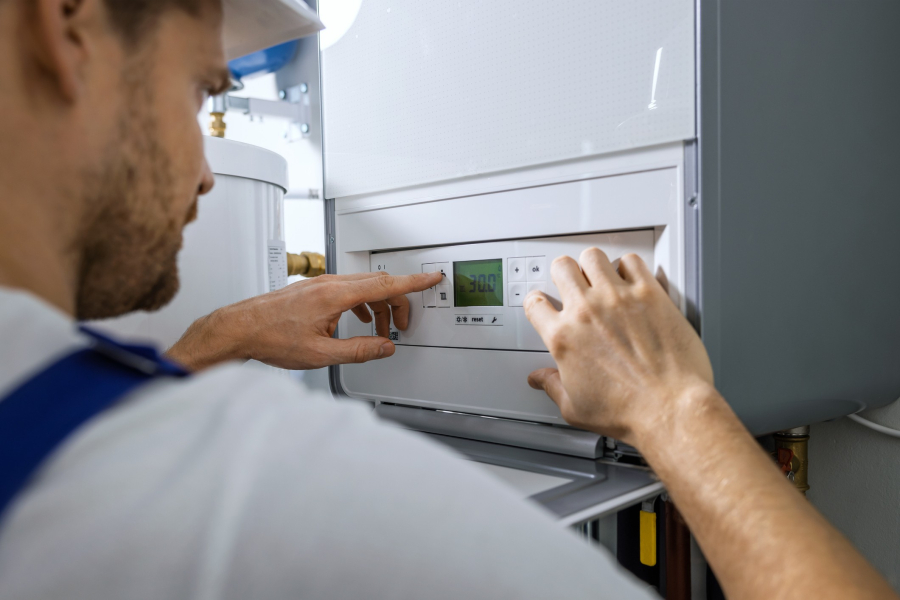
As the chill of the colder seasons sets in, the perennial debate among homeowners resurfaces: "Boiler vs. Furnace." Each heating system, with its unique mechanism and benefits, promises to dispel the cold and wrap your home in warmth. However, delving into the intricacies of both can assist homeowners in discerning which option aligns best with their household requirements and preferences.
What is a Boiler?
At its core, a boiler operates as a closed vessel in which water is heated and subsequently transformed into steam or hot water. This steam or hot water then travels through a network of pipes to radiators, under-floor piping, or other radiant heating systems to disseminate heat throughout a residence.
One of the standout features of boilers is their versatility in energy sources. They can efficiently run on a variety of fuels, ranging from natural gas and oil to electricity and, in some traditional setups, wood. This adaptability not only provides homeowners with a choice in energy sources but can also be a determining factor in areas where certain fuels are more accessible or cost-effective.
The direct heat transfer method employed by boilers, via water or steam, ensures a consistent and comfortable warmth, making it a preferred choice for many households, especially in regions experiencing harsh winters.
What is a Furnace?
A furnace, often referred to as a forced-air heating system, is a device designed to produce and distribute warm air throughout a home.
Unlike boilers, which utilize water or steam as a heat transfer medium, furnaces directly warm the air. The process begins when the furnace ignites its fuel source, be it natural gas, electricity, oil, or propane. As this combustion takes place, air is heated and then a blower motor propels this warmed air through a series of ducts. These ducts, strategically positioned, ensure that the heat is evenly distributed across various rooms, ensuring consistent temperature levels.
The efficiency of modern furnaces allows for rapid warming, making them an ideal choice for quick temperature adjustments. Their design also enables them to pair seamlessly with central air conditioning systems, providing both heating and cooling from a singular unit. As a result, furnaces remain a popular choice in many North American homes, appreciated for their straightforward operation and effective heating capabilities.
Key Differences Between Boiler and Furnace
When deciding on a heating system for your home, understanding the primary distinctions between a boiler and a furnace can make all the difference. Here's a breakdown of their key differences:
- Heating Method
At the heart of their operations, boilers and furnaces utilize entirely different methods to produce heat. Boilers heat water, turning it into steam or retaining it as hot water, which is then circulated throughout the home. Furnaces, on the other hand, heat the air directly and use a blower to push this heated air through ducts to warm the home. - Distribution System
The distribution mechanisms in these two systems are also starkly different. Boilers distribute the generated heat using a network of pipes that lead to radiators or radiant heating systems placed in various rooms. Furnaces use a more straightforward approach, relying on a system of ducts to deliver the warm air across different spaces in the house. - Efficiency
The efficiency of both systems can vary widely based on their make, model, and design. However, modern units, whether boiler or furnace, are designed with energy savings in mind. While some high-efficiency boilers can capture and use over 90% of their fuel's energy, furnaces too have made significant advancements with some models achieving similar efficiency rates. Always check the AFUE (Annual Fuel Utilization Efficiency) rating when comparing the efficiency of different units. - Lifespan
Durability and lifespan are crucial considerations when investing in a heating system. On average, boilers tend to outlast furnaces. While the typical boiler can serve a household for 20 to 30 years, furnaces usually have a lifespan of 15 to 20 years. However, regular maintenance can extend the longevity of both systems. - Installation Cost
The initial outlay for installing either a boiler or furnace can vary considerably based on factors like the size of the unit, the complexity of the installation, and the brand chosen. Generally, the installation cost for boilers might be higher due to the need for setting up a piping system and radiators. Furnaces, which require ductwork, might have lower initial costs but can become pricier if duct installation is needed.
The decision between a boiler and a furnace should be rooted in your home's specific requirements, budget constraints, and long-term heating goals. Both systems have their merits, and understanding their key differences can guide you to an informed choice.
Benefits of Using a Boiler
When contemplating the right heating solution for your home, considering the advantages of each system can help streamline your decision. Boilers, for instance, come with a set of unique benefits that set them apart:
- Even Heating
One of the standout advantages of using a boiler is the consistency in warmth it offers. Thanks to radiant heat, boilers can provide an even distribution of warmth across rooms. Unlike forced-air systems that might cause hot and cold spots in various parts of the house, radiant heating ensures that every corner of the room receives consistent warmth. This creates a more comfortable and uniform heating experience throughout the home. - Quieter Operation
For those who value tranquility in their homes, boilers are a winning choice. Since they don’t rely on blowers to circulate air, they operate much more quietly. The absence of the constant hum or periodic starting sounds of a blower means that you can enjoy a peaceful indoor environment, especially during those cold, quiet winter nights. - Less Dust and Allergens
Boilers come with the added health benefit of reduced allergen circulation. Since there's no forced air involved, there's a notable decrease in the amount of dust, pollen, and other airborne allergens blown around the home. This can be particularly beneficial for households with individuals who suffer from allergies or respiratory issues, ensuring a cleaner and healthier breathing environment.
Boilers offer a blend of efficiency, comfort, and health benefits that can be especially enticing for many homeowners. The even warmth, quiet operation, and cleaner air make them a compelling choice for those looking for a holistic heating solution.
Benefits of Using a Furnace
When weighing the options between different heating systems, it's vital to understand the distinct advantages each offers. Furnaces, popular in many homes, present a range of benefits that cater to various homeowner needs:
- Rapid Heating
One of the primary advantages of furnaces is their ability to heat spaces quickly. As soon as a furnace starts operating, it begins circulating warm air, ensuring rooms reach the desired temperature in a relatively short amount of time. For those chilly mornings or when coming home to a cold house, the swift response of a furnace is a much-appreciated feature. - Versatility with Central Air Systems
Furnaces are not just about heating. Their design often allows seamless compatibility with central air conditioning systems. This means that the same ductwork used to distribute warm air in colder months can be utilized to circulate cool air during the summer. This dual-functionality offers homeowners a comprehensive climate control solution for all seasons without needing separate systems. - Economical Initial Setup
For homeowners on a budget or those who are mindful of initial investment costs, furnaces generally offer a more economical setup compared to other heating systems. The initial purchase and installation cost of many furnace models tend to be lower than that of boilers, making it an appealing option for those looking to balance performance with upfront expenses.
Furnaces are a versatile and cost-effective heating solution that many homeowners favour. Their rapid heating capabilities, compatibility with cooling systems, and budget-friendly installation costs make them a popular choice for those seeking efficient and comprehensive climate control for their homes.
Inspection and Maintenance
Understanding the heating system you choose is crucial, but equally important is recognizing the value of its regular inspection and maintenance.
Longevity of the System
Routine check-ups and maintenance can significantly extend the lifespan of your heating system. By addressing minor issues before they escalate, you prevent wear and tear that could lead to a premature breakdown. Just as you would service your car to ensure it runs efficiently for years, the same principle applies to your home heating system.
Maintain Peak Efficiency
Over time, without regular checks, both boilers and furnaces can lose their efficiency due to the accumulation of dust, wear of components, or minor technical glitches. A well-maintained system doesn't have to work as hard to achieve the same results, ensuring that your home is heated optimally while consuming less energy. This not only reduces energy bills but also contributes to a greener environment.
Safety First
A faulty boiler or furnace isn't just inefficient; it can be dangerous. Issues like gas leaks or carbon monoxide emissions can pose severe risks to your family's safety. Regular inspections ensure that such hazards are detected and addressed in a timely manner, guaranteeing peace of mind alongside a warm home.
Considering an Upgrade or New Installation?
The decision to upgrade or install a new heating system can be driven by various factors.
- Ageing Systems
The average lifespan of furnaces and boilers ranges between 15-20 years, depending on the brand and maintenance routine. If your system is nearing the end of this range, it's time to consider an upgrade. An old system, even if operational, might not be energy efficient, leading to higher energy bills. - Rising Energy Bills
Have you noticed a steady increase in your heating costs over the years? This could be a sign of decreasing efficiency in your current system. Newer models, whether boilers or furnaces, come equipped with advanced technology designed to maximize efficiency, potentially saving you a significant amount in the long run. - Consistent Repairs
If you're frequently calling in professionals to fix issues, it might be more economical to invest in a new system rather than pouring money into continuous repairs. - Enhanced Efficiency
Today's heating systems come with advanced features like programmable thermostats, zone heating, and higher AFUE (Annual Fuel Utilization Efficiency) ratings. These can provide enhanced comfort while being more energy-efficient and environmentally friendly.
Deciding between a boiler and a furnace is more than just a choice of equipment; it's about selecting the right fit for your home's unique needs. Each system has its strengths, and the best choice often depends on individual circumstances like the structure of your home, climatic conditions, and budget constraints.
The Boiler Shoppe Advantage
Our team ensures a seamless transition, from helping you choose the right model that fits your needs to the installation process. Every step is carried out with precision, ensuring that your home is equipped with a system that's both efficient and long-lasting.
Ready to ensure your home stays cozy all winter long? Contact The Boiler Shoppe for a personalized quote on boiler installation or service.
